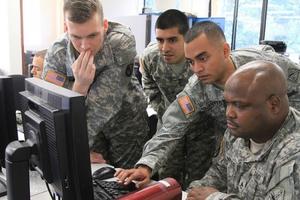CybersecurityA major cyberattack causing widespread harm to national security is imminent: Experts
A new report found that more than 60 percent of the roughly 1,600 computer and Internet experts surveyed on the future of cyberattacks believe a nationwide cyberattack is imminent. They did so in response to the question: “By 2025, will a major cyberattack have caused widespread harm to a nation’s security and capacity to defend itself and its people?” The experts also warn about the risks to privacy which will accompany a growing focus on cybersecurity.

Cyber attacks could incapacitate military operation // Source: dodlive.mil
A new report from the Pew Research Center and Elon University’s Imagining the Internet Center found that more than 60 percent of the roughly 1,600 computer and Internet experts surveyed on the future of cyberattacks believe a nationwide cyberattack is imminent. They did so in response to the question: “By 2025, will a major cyberattack have caused widespread harm to a nation’s security and capacity to defend itself and its people?” The experts also warn about the risks to privacy which will accompany a growing focus on cybersecurity.
TheInquirer reports that some survey respondents believe that the worst cyber threats would be containable. “While, in principle, all systems are crackable, it is also possible to embed security far more deeply in the future Internet than it is in the present Internet environment,” said Lee McKnight, a professor at Syracuse University’s School of Information Studies.
Many experts cited the Stuxnet worm as an example of how a cyberattack could damage critical infrastructure such as power grids, air-traffic controls, and financial networks. Stuxnet, believed to have been engineered by U.S. or Israeli intelligence to damage Iran’s nuclear program, infected the software of at least fourteen industrial sites in Iran and helped destroy roughly 20 percent of the centrifuges being used to enrich radioactive fuel. “The majority opinion here is that these attacks will increase and that lots of institutions, including major government institutions, will be at risk,” said Lee Rainie, director of the Pew Research Internet Project and co-author of the report.
Jason Pontin, editor and publisher of the MIT Technology Review, likened Stuxnet to “a Pearl Harbor event.”
“Do we really believe that the infrastructure of a major industrial power will not be so attacked in the next 12 years?” he asked. “The Internet is an insecure network; all industrialized nations depend on it. They’re wide open.”
Some experts believe the threat of “mutually assured destruction” could discourage state-sponsored cyber warfare. “Right now, cyberattacks are too costly,” one survey respondent said. “The bigger risk will be when cyber crooks drain Wall Street of all its cash.”
Report co-author Janna Anderson of Elon University warns, however, that some threats are being exaggerated for profitability, adding that privacy would continue to suffer as a result. According to Jonathan Grudin, a principal researcher at Microsoft Research, concerns about cyberattacks “seem exaggerated by the political and commercial interests that benefit from us directing massive resources to those who offer themselves as our protectors.” In reference to President Dwight Eisenhower’s 1961 warning about the influence of a “military-industrial complex,” Grudin said lawmakers seem “powerless to rein in the military-industrial-intelligence complex, whose interests are served by having us fearful of cyberattacks.”
